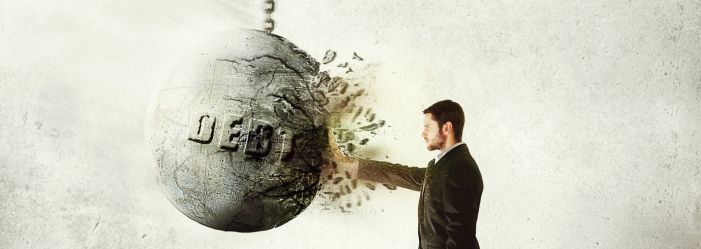Last Updated: December 07, 2023
Break Free From This Vicious Cycle

Debt is a common issue that has plagued people for years. However, when you have the right plan in mind and know how to manage your money effectively then it's possible to break free from this vicious cycle.
The number one reason why so many people do not get out of debt quickly enough or at all usually boils down to two things: they don't understand budgeting; and their plans are ineffective because there isn't any set timeline on them (i.e., no deadlines).
On top of those reasons, sometimes people also struggle with certain aspects like being able to find ways around paying high interest rates which can be crippling if left untreated - we've got solutions though!
The debt cycle
I'm sure that most of us have heard the phrase "The cycle of debt" at some point in our lives. But, what does it actually mean? The cycle of debt is a metaphor for how people get trapped into a loop where they can't pay their bills and are constantly borrowing money to cover them up.
This leads to more fees and interest rates, which only makes it harder for someone to break free from the cycle. If you've been struggling with your finances, there are options out there today that can help you break free from the cycle of debt!
How to get out of debt
Many people have debt, and they wonder how to get out of it. There are many reasons why people have debt, but the main reason is that they spend more than what they make. Here are some tips on how you can get out of debt if this is your situation.
Get a plan
Taking the time to get on paper how much you owe, your monthly income and expenses is important before starting any kind of repayment strategy or getting into more debt. This will avoid problems like forgetting about paying some debts off first in order to pay others quicker, which can get costly and lead back onto the cycle of debt.
To get out of debt as soon as possible, make sure you're working with an expert who knows what they are doing!
Debt Escape Plan You Can Start Today
Getting out from overwhelming debt may seem hopeless, but creating a detailed repayment plan can restore your sense of control.
Follow these steps to start your debt escape plan:
- List all debts with balances and interest rates
- Set a monthly payment goal
- Build an emergency savings fund
- Curb overspending by sticking to a budget
- Pay more than minimum each month
- Seek balance transfers, lower rates
- Communicate with creditors if struggling
- Consider debt management assistance
Get help if necessary
Sometimes people need a little extra push to get them going again when it comes down to their finances. That's why sometimes professionals can come in handy because they know all the ins and outs that go along with taxes.
Speak to debt settlement specialist. Our initial consultation is free, and our debt experts will explain your options to you.
What can you do about it if you're in debt and want to get out fast?
The first thing an individual who is in debt should do is create a budget for themselves so they know where all their money goes each month. Then, work on reducing your monthly expenses by cutting down on things like cable or other services you might not need at the moment. Once those two tasks are complete, contact your creditors and see about negotiating lower payments with them so that you are able to get out of debt faster.
If you're not sure about what your creditors might say, it wouldn't hurt to start the conversation by looking for a credit counselor in your area who can help negotiate with them on your behalf and get you started down the path to getting out of debt!
What is your financial situation like, and what's your plan moving forward
The most important thing to remember when it comes to your financial plan is that whatever you do, you need to make sure you are always living within your means and not spending more than what you bring in. If this sounds simple, then think again because many people find themselves going into debt just for the sake of "living life."
I am a firm believer in the power of financial planning. It's not just about having enough money to pay your bills, but it is also about setting up a plan for retirement and savings.
Getting rid of credit card or student loan debts
If you are struggling to make ends meet because of credit card or student loan debt, you may be feeling overwhelmed. With so many options for paying off your debt and advice from all sides about what to do, it can be hard to know where to start.
A recent study found that after you've paid off your credit card debt, the next thing on your list should be student loans. The average college graduate has about $32,200 in student loan debt which is a big chunk of change to pay back with a starting salary as low as $40,000. Other debts like car payments and mortgages can wait but paying off this debt will mean more money in your pocket each month for other necessities like food and clothing.
-Figure out where your money is going and cut back. I found that by cutting back my spending on unnecessary things, I was able to save up more money for paying off my debts.
-If you have a high-interest rate, find the best rates available for loans so that you can minimize the amount of time it takes to pay off your debt. Once you start making payments, continue with them until they're paid in full! Even those with a low income can find strategies to pay off their debts. For more information, read How to Get Out of Debt with Low Income.
Keep a strict budget so you can track
It's easy to get caught up in the day-to-day hustle and forget about your money. Tracking your spending can be a challenging task, but it's worth it for many reasons. You can see where you're overspending and how much debt you're accumulating which is not only helpful for budgeting but also allows you to pay off debts quicker and increase savings!
The best way to track your expenses is with an app like Mint or Personal Capital which will automatically gather all of your transactions from bank accounts, credit cards, loans, student loans, etc. so that when I have more time I don't have to worry about manually adding everything up on spreadsheets!
Get Empowered with A Solid Budget
Creating a budget that works is crucial for getting out and staying out of debt.
Follow these tips:
- Leverage budgeting apps like Mint to automatically track spending
- Build a budget template that factors in all expenses
- Set discretionary spending limits for things like dining out
- Save first before spending on wants
- Build in a 10-20% buffer for unexpected expenses
- Review and adjust monthly to improve accuracy over time
Creating a budget is one of the most effective tools for managing your debt. For a comprehensive guide on debt management plans, see Debt Management Plan 101: Understanding How to Get Out of Debt and Stay Debt-Free.
Cultivate the Mindset for Success
"How you think about money influences how you manage and spend it," says financial psychologist Dr. Brad Klontz. In order to change your financial patterns, you must first change your financial mindset.
- Check any unconscious beliefs about debt or wealth
- Adopt an abundance rather than a scarcity mentality
- Focus on goals bigger than short-term wants
- Celebrate small wins and stay motivated
Another key factor in successfully managing debt is understanding that you can often resolve your debt issues yourself. For guidance on tackling this challenge, see How to Get Out of Debt Yourself.
Red Flag Behaviors to Avoid
Many common behaviors sabotage debt payoff plans. Watch out for:
- Splurging with windfalls rather than paying off debts
- Leaning on credit when budgets fall short
- Neglecting payments to eliminate smaller debts first
- Not communicating with creditors until past due
- Punishing missteps with financial self-loathing
Catch yourself exhibiting any of these red flags. Course correct quickly to get your plan back on track.
Myths That Keep You Trapped in Debt
Many people struggling with debt believe certain myths that inadvertently keep them stuck in the debt cycle.
Here are some common misconceptions along with the reality you need to know:
- "Consolidating debt with a loan will solve my problems." Reality: Debt consolidation can simplify payments and occasionally lower interest rates, but it tackles the symptom more than root cause. You have to address overspending habits for lasting change.
- "I can skip a debt payment if I'm short on cash this month." Reality: Skipping payments leads to late fees, penalty rates, and damage to your credit score. Paying late should only be a last resort in dire emergencies.
FAQs
Conclusion
When you think of getting out of debt, it can seem like an impossible task. However, with a few simple steps and some discipline on your part, you'll be able to get back on track in no time! If this sounds too hard for you or if you're not sure where to start, don't worry - we can help.
Speak to a credit counselor or contact a debt settlement specialist. They can give you information on how to get out of debt and help you learn to stay out of debt for good.
✔ Accredited by Better Business Bureau with BBB A+ rating (4.93 rating and 1678 reviews)
✔ US News and World Reports and Bankrate ranked Pacific Debt Relief as one of “The Best Debt Relief Companies of 2024”
✔ 6.9 star rating by BestCompany.com (over 2379 client reviews)
✔ 4.8 star rating by TrustPilot based (over 1613 verified consumer reviews)
✔ ConsumerAffairs.com Accredited (over 544 verified reviews with an average rating of 5 stars)
✔ A Top 10 Rated Compan by TopTenReviews.com , ConsumersAdvocate.com and Top10debtconsolidation.com
✔ 4.6 star rating by Google (229 client reviews)
✔ 100% rating by SuperMoney (9 client reviews)
Reduce Your Credit Card Debt By Up to Half

BBB Reviews | 4.9/5.0 Rating









 Do Not Sell My Personal Information
Do Not Sell My Personal Information